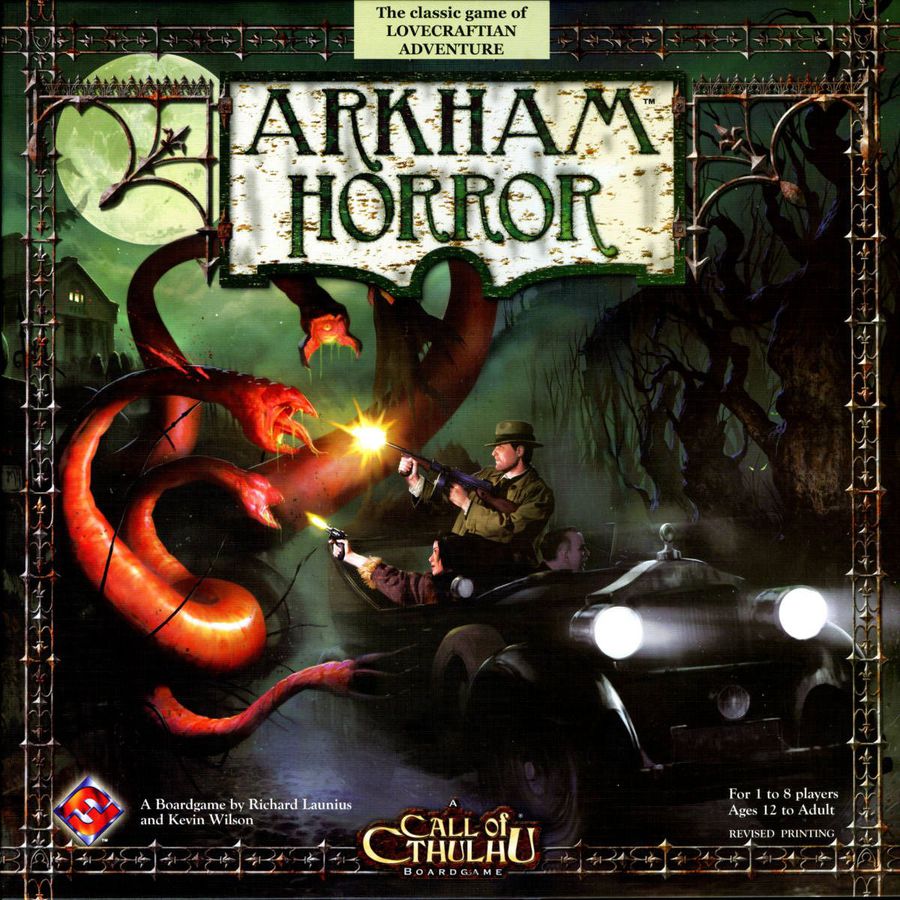Despite writing frequently about roleplaying games and video games, I have been playing a lot of board games recently. In fact, I have played about a dozen board games over the past month ranging from casual party games like Scattergories to intense strategy games like Terra Mystica. I enjoy them all for different reasons, but if forced to choose a favorite game or style of game, I would pick cooperative games.
Most people are probably only familiar with competitive board games like Risk or Scrabble where some players win and some players lose. In cooperative board games, everyone is on the same team playing agains the board. In Forbidden Desert, the players are trying to uncover and assemble an airship before the sand buries everything and the sun wears them out. In Arkham Horror, the players are investigating Lovecraftian mysteries to gather enough knowledge to stop an Ancient Evil from devouring the world.

I like cooperative games because I think the real life is fundamentally cooperative. Although I can see the benefits of competition when it inspires us to greater outcomes for everyone, I think most of the biggest challenges we face aren’t other people. At a micro level, most people work on teams. At a macro level, we have problems like climate change to deal with. And I think the games we play, especially when it comes to strategy, should reflect that.
And I like the feeling we triumph and working together as we go through games. A game designer once said that the biggest crutch in board game mechanics is turn-taking. I think another is competition.
And yet, I do think that cooperative games suffer from a few traps that I have yet to see built out well.
The biggest problem is that in cooperative games, it’s easy for one person to dominate. In a benevolent situation, it’s the “smartest” person who makes the decision for everyone. In a more adversarial situation, it’s the loudest. Either way, the players aren’t fundamentally cooperating when one person tells them where to move their piece or is always appealed to for advice. Where’s the cooperation there?
I think there are a few properties that make this inherent to many cooperative board games where it doesn’t mimic real life.
First, most board games are designed to be quite tractable. In a sense, it’s possible for a person to fully understand the rules and reason about it as a complete system to determine the best way to win. This is fundamentally unlike the real life, which isn’t a game. In real life, everyone comes to the table with unique skills and different perspectives required to fully explore a complex and unpredictable space to solve problems together. In a cooperative game, the best idea should win, and it’s possible for one person to gain a monopoly on the best ideas.
There are a few ways to deal with this by introducing pressure or asymmetries to give individual players unique responsibilities, but many feel like cop-outs.
First, you can introduce time pressure. Maybe given enough time, one person could figure it all out, but if you’re short on time, you have to divvy up the work in a smart way. Captain Sonar is a game that does this to some degree within a team.
Second, you can introduce physical constraints on the game. I’m actually really not sure how this would work, but I would use sports as an example for where you need multiple people. You can’t cover an entire court with one person.
Third, you can introduce imperfect information. In Hanabi, table talk is largely discouraged as communication happens only through the game. This is the most common, but I actually find this frustrating often because again, I feel like this only constrains how people can collaborate artificially. We should be able to work together, and it’s always easy to snake around to get the right information out there, but the balance is difficult. Also, restricting communication takes away much of the social aspect of board games that I want.
All of that being said, I think this problem of cooperative games can be solved by one principle and one rule of etiquette.
The one principle: it’s more important to cooperate than to win.
The rule of etiquette: don’t offer advice unless explicitly requested.
When we’re playing a cooperative game, we’re all playing together and want to achieve that as a group. I think the table captain impulse comes when another player might make a decision that hurts our chance to win, and we have to set them right. However, it’s important to remember that it’s their choice to make, right or wrong, and taking that away also takes away their agency in the game.
But of course, it’s cooperative, so we shouldn’t be completely independent. The simple rule is not to offer advice unless it’s explicitly requested. If someone says, “what do you think I should do?” then we can jump in to work together on it.
However, it can be unclear in-between. If someone says, “I’m not sure what to do,” I don’t think that’s an invitation to give them advice. That’s an invitation to start a conversation with something like, “What are the options you’re considering?” Maybe the conversation will lead to a “Do you think I should do A or B.”
And maybe that is the big lesson of cooperative games: how best to cooperate. Even in real life, there often aren’t hard rules on how exactly we’re supposed to work together, but if we can agree either explicitly or just by example on the right ways to work, that really is the takeaway from games.